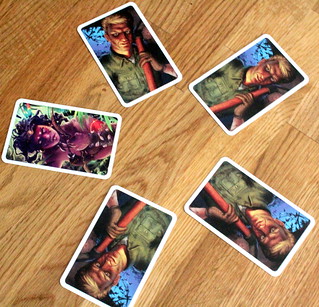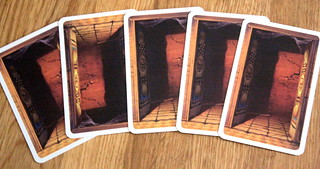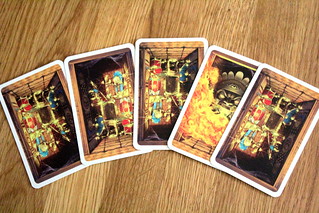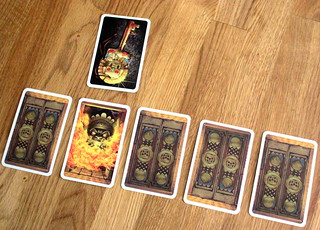| Strategy | Luck |
|---|---|
| Interaction | Components & Design |
| Complexity | Score |
A mysterious temple in the jungle, untold treasures inside. But it is pretty darn dark inside here, impossible to see anything. We’ll just feel around for the doors and hope we find some treasure. But the sound is weird. I could swear there are more footsteps in here than we brought people in…

That’s the somewhat peculiar premise of Tempel des Schreckens (translated: Temple of Terror), a German version of Yusuke Sato’s social deduction game Don’t Mess with Cthulhu / Timebomb. (There appear to be some minor rules changes, so I’m not going to call it the same game.) A group of adventurers has found a temple in the middle of the jungle and enter it in search for treasure. Inside, unnoticed by all of them, they are joined by a number of temple guardians who want to lure the expedition into the temple’s fire traps. And because everyone is only looking at their smartphone nowadays, no one knows which group any of the others belong to. Guys, we’ve been walking through the jungle together for weeks, but I can’t tell you apart from the women guarding this temple.
Robbing temples in the dark – The Rules
As usual for a social deduction game, players are assigned a role – Adventurer or Temple Guardian – before the start of the game. The Adventurers are usually in the majority, but you always pick one more role card than there are players, so you can’t know for sure how many people are on your side. Then you assemble a deck of five cards per player that has many empty Chambers, a few well-filled Treasure Chambers and two or three Fire Traps. Shuffle that deck, deal five cards to each player and the expedition is ready to go.

All players look at their treasure cards, shuffle them, and line them up face down on the table. Then they announce their role and what cards they have for this round. Telling the truth here is optional and should often be avoided.
A randomly chosen start player picks a card in front of another player and turns it over. Nothing happens at this point, no matter what the card shows. The chosen player becomes the new explorer and it’s now her turn to pick a card from another player to flip. This continues until as many cards are flipped as there are players. However, there’s no obligation to flip a card from each player, so some players may end the round with all their cards still on the table while others may have all their cards flipped.

Cards remaining on the table face down are collected, reshuffled and dealt out again for the new round, now with four cards per player, then three and finally two. There are three ways the game can end. When the last Treasure Chambers is revealed the game ends immediately and the adventurers win. When the last Fire Trap is revealed the game ends and the Temple Guardians win. And if the fourth round ends and one or more Treasure Chambers remain undiscovered the Temple Guardians also win.
Did we find treasure? The Verdict
Even for a social deduction game, a genre that usually has few rules, Tempel des Schreckens is light. Two roles, three types of cards to discover, four rounds, no special rules, roles, or actions in sight. That doesn’t have to be a problem, many good games have a very simple set of rules with no specials. And social deduction games get a lot of their fun from the social part: discussing who might be lying, bluffing, deducing.
I’m sorry to say, despite its inclusion on the Spiel des Jahres Recommendation List, Tempel des Schreckens fell flat for us. The discussion part works, there’s a lot of guessing and yelling and strategising around the table. The problem is that you really lack the tools to get reliable information. If you want to know for sure if someone is lying, the only option is to flip all their cards in one round. And then you still might only know they were telling the truth this round, that doesn’t mean they aren’t secretly a Temple Guardian. Other than that, only a very careless or a very unlucky liar get caught. I don’t know, for some groups it might feel tense, for us it felt random.

I wanted to like Tempel des Schreckens because I’m generally a fan of social deduction games, and having one that works with as few as three players and doesn’t need a game master sounded pretty cool. But in the end, there just wasn’t enough there. After five games, the lack of any special pieces combined with the lack of tools to get reliable information was just too much for me. I wanted some special roles with fun abilities. I wanted some rooms that do special things when they’re uncovered. Barring that, I wanted something to survive the complete reset at the end of each round, so some bits of information beyond “they were/weren’t lying before” remains relevant for the next round.
And just maybe I wanted the theme to make more sense, because really: After going through the jungle together you should be able to tell your fellow Adventurers from the Temple Guardians by their faces, their voices and their body odor.
All that said, it’s a solid game. The mechanics work, and for a few games it’s fun. In larger groups it even stays fun for a bit longer. And I’m a big fan of not needing the game master. So there are good points about Tempel des Schreckens, but at least for our test group it lacked the staying power.







